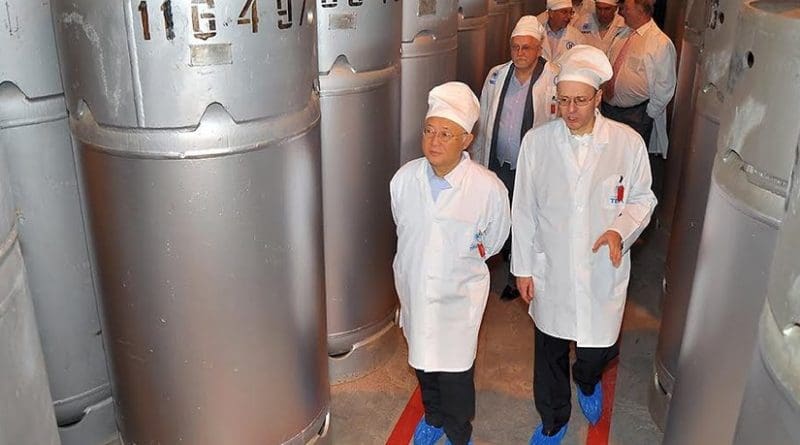Nuclear Proliferation: IAEA Convention Can Minimize Threat – OpEd
The International Atomic Energy Agency (IAEA), the UN nuclear watchdog, said that more than 100 countries will have to meet higher standards on the protection of nuclear facilities and materials from now onwards. For doing so, of course one has to bind themselves with certain sets of obligations that can assume the shape of treaties and international bindings which are either legally enforceable or are self-imposed. For that matter, along with many others, the most recent and blazing one of these strictures is the Convention on the Physical Protection of Nuclear Material (CPPNM) that yet has to enter into force absolutely.
At the outset, the CPPNM initially entered into force on February 8, 1987, is actually a legally binding international instrument in the area of physical protection of nuclear material. It establishes measures related to the prevention, detection and punishment of offences related to nuclear material. But on July 8, 2005, States Parties to the CPPNM adopted an amendment to the CPPNM (a concern that refrained few countries from ratification) which expands the scope of the convention to cover nuclear facilities and nuclear material in peaceful use, storage and international as well as domestic transportation. IAEA chief Yukiya Amano said that the amendment will help reduce the risk of a terrorist attack involving nuclear material, which could have catastrophic consequences.
Besides, Nicaragua just, formally completed ratification of an amendment to the Convention on the Physical Protection of Nuclear Material. Pakistan too ratified the 2005 Amendment to the CPPNM just a few days back, meaning enough states have ratified it for it to go into force. At large 10 countries ratified the 2005 Amendment to the CPPNM in 2016 specifically, allowing it to reach the required two thirds necessary to enter into force; the states are: Côte d’Ivoire on February 10, Paraguay on March 11, New Zealand on March 18, Pakistan on March 24, Marshal Islands and Serbia ratified on March 30, Azerbaijan ratified on March 31 and last but not the least Cameroon, Montenegro and Kuwait ratified the amendment on April 1, 2016.
The convention was adopted by 152 countries a decade ago, and had to be ratified by two-thirds of them to go into effect. The amendment, intended to guarding against threats such as smuggling and sabotage, makes it legally binding for countries to protect nuclear facilities as well as the domestic use, storage and transportation of nuclear material. The United States, Russia, India, Pakistan and former Soviet republics including Kazakhstan, Ukraine and Uzbekistan are among the countries that have ratified the amendment and are also acknowledged by the IAEA. Iran and North Korea are yet out of it.
The provisions to which the CPPNM obligates the parties to are given as: one, make specific arrangements and meet defined standards of physical protection for international shipments of nuclear material for peaceful purposes (plutonium, uranium 235, uranium 233 and irradiated fuel), according to Annexes I and II and IAEA INFCIRC/225; two, undertake not to export or import nuclear materials or to allow their transit through their territory unless they have received assurances that these materials will be protected during international transport in accordance with the levels of protection determined by the Convention; three, co-operate in the recovery and protection of stolen nuclear material, by sharing information on missing nuclear materials; four, criminalize specified acts, including misusing or threatening to misuse nuclear materials to harm the public; and five, prosecute or extradite those accused of committing such acts. States’ Parties undertake to include those offences as extraditable offences in every future extradition treaty to be concluded between them.
The CPPNM also presents itself for broader cooperation among countries on finding and recovering stolen or smuggled nuclear material. Likewise, it promotes international cooperation in the exchange of physical protection information too. Nevertheless, a legal aspect of the convention and amendment is that only the states that have ratified it would be subject to relevant binding; that actually is a matter of concern since it has yet to be entered into force at large.

